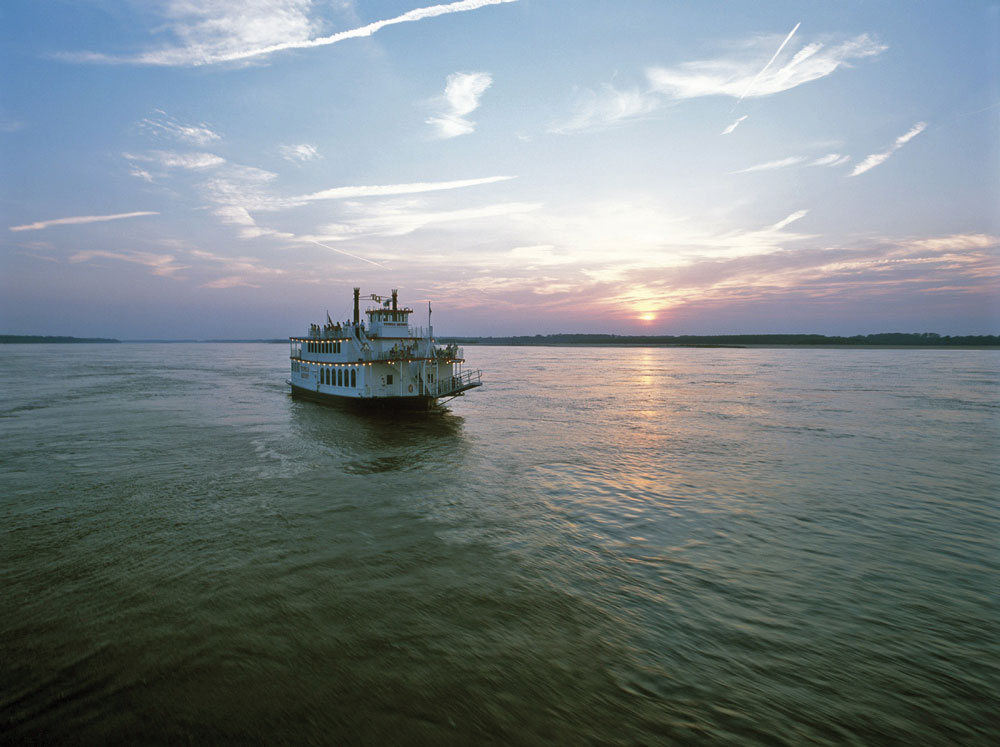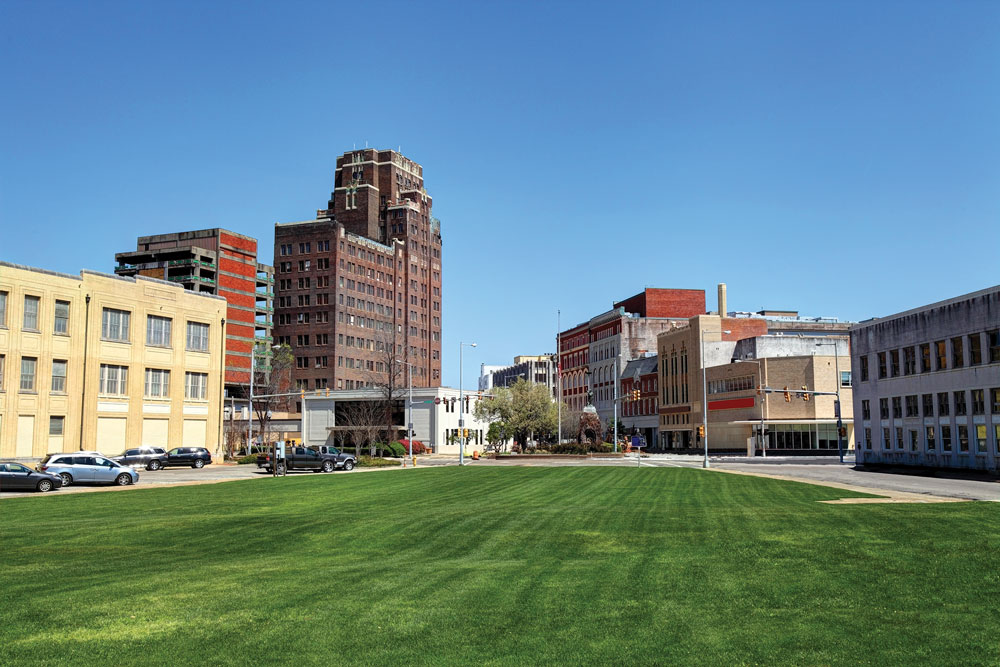For as long as freshwater has glided through the channels of the Mississippi and Yazoo rivers, forming the alluvial plain known today as the Mississippi Delta, key chapters of American history have laid claim to the fertile landscape.
The Mississippi Delta became a pillar to generations of early agriculture, evolving into a problematic system reconstructed by outcomes of the Civil War. The arrival of this period presented the opportunity to tap into new economic development initiatives in order to redefine a vastly rural region of the state.
Agriculture remains a vital force in the region today, although the Delta has found its stride in supporting a variety of industries. This rings true, even in a small Delta community of over 1,800 residents. In western Bolivar County, resting along the Mississippi River, the city of Rosedale welcomes back a former resident aiming to reimagine his historic hometown by introducing the Delta’s first distillery.
The faces behind the newly established Rosedale Distilling Company are husband and wife duo Jack and Elizabeth Coleman, who left Washington, D.C. to pursue development of Mississippi’s largest distillery. Taking notice of prime downtown real estate with proximity to the Port of Rosedale, bolstered by riverboat docking updates made to neighboring Terrene Landing, Coleman saw a strategic avenue to stimulate tourism in the city.
“Rosedale will be the first impression that thousands of Mississippi River cruise boat passengers will get when they come to tour the Delta,” said Coleman. “We are committed to a Rosedale renaissance, and putting historic buildings back into use for our distilling operations is the first step.”

River boat on the Mississippi River
Photo courtesy of Mississippi Development Authority
In November 2024, the company began a $23 million renovation on 130,000-sq.-ft. of historic buildings in Rosedale, including the 111,400-sq.-ft. former Alabama Metals Product Company factory and 18,500-sq.-ft of vacant buildings in the city’s downtown. The Alabama Metals facility will serve as Rosedale Distilling’s primary distillery, while the downtown buildings will house tasting rooms, live music events, culinary experiences and more.
“The most exciting aspect is the opportunity to turn an underutilized industrial site into an anchor for tourism, entrepreneurship and local pride,” says Cleveland-Bolivar County Chamber of Commerce Executive Director Hannah Aguzzi. “Breathing new life into this once bustling property reflects a broader vision for rural revitalization — where heritage and innovation intersect to create long-term economic value.”
Aguzzi says the region’s strong cultural brand, deep Southern roots, and an overall growing interest in authentic tourism experiences in historical communities provide a compelling environment for craft spirits to flourish in Rosedale.
Terrene Landing’s $2.5 million upgrade is expected to result in 40,000 visitors a year passing through the city, presenting no better time for the project’s introduction to downtown Rosedale. The anticipated 2025 opening of the new distillery joins a growing menu of lifestyle amenities in the county, falling directly in line with community engagement and placemaking efforts by local leadership.
“It speaks volumes about the entrepreneurial spirit that exists in our rural communities. Rosedale Distilling is a great example of how local vision can catalyze meaningful growth,” Aguzzi notes. “It also demonstrates that the Delta is a place where small businesses can thrive with the right resources and collaborative support.”
A closer look at project investments landing in the Delta over the past year offers credence to the sheer capabilities of the region’s manufacturing workforce within sectors such as aerospace, electronics and metals.
Aerospace companies GE Aviation Systems and Greenville Kearns Aerospace Maintenance both decided to pour into their Mississippi-based operations in Batesville and Greenville, respectively. GE Aviation’s larger $1 billion commitment to its U.S. manufacturing locations announced in March 2025 included an $11 million investment to increase production of innovative parts while advancing manufacturing processes. Upgrades to the Batesville facility include new industrial equipment, precision measuring tools, high-precision machines and inspection technologies. The investment aims to boost quality and production of parts used in narrowbody and widebody aircraft engines, military fighter jets and helicopter engines.
Meanwhile, 111 miles southwest in Washington County, an $11.5 million investment will soon unveil Greenville Kearns Aerospace’s two retrofitted aircraft hangars at the Mid Delta Regional Airport. The move cements the company’s presence in the region following occupation of a leased hangar at the airport since 2022. The site will support aircraft painting, paint striping, hazmat capture and hazmat storage and containment operations, creating 31 new jobs.

Sunrise on the Pascagoula River Delta
Photo: Getty Images
“Delta Compass and Washington County Economic Alliance are happy to see the forward momentum of our Delta economy,” said Delta Compass – Washington County Economic Alliance President and CEO Justin Burch. “Synonymous with agriculture, our community is seeing more nuance coming to our industry sectors in transportation, distribution, logistics, advanced manufacturing and now aerospace. GKAM will be a great addition to our growing list of employers, and we appreciate their co-impact to our community.”
Rural resurgence within the Mississippi Delta is notable for a variety of factors. A growing portfolio of startup, domestic and international companies value not only the region’s U.S. market proximity, robust talent pipeline and site availability, but the support and resources in place designed to aid growth.
Activity Heads East
Behind the scenes of leading projects announced in Mississippi, one will find the product of years of diligent preparation. So is the case for Lauderdale County, whose city of Meridian will soon house one of the largest hyperscale data center campuses in the southeast.
East Mississippi Business Development Corporation President and CEO Bill Hannah notes the region could not have been more prepared to welcome Compass Datacenters’ massive $10 billion investment to the city. In the early 2000’s, the county purchased a site in Meridian, to which local leadership later introduced water, sewer, power, gas and fiber infrastructure to develop the planned industrial park. These efforts were bolstered years later by a $4 million site work package approved by Gov. Tate Reeves.
“The Delta is a place where small businesses can thrive with the right resources and collaborative support.”
— Hannah Aguzzi, Executive Director, Cleveland-Bolivar County
“Numerous projects have come and gone, but suffice it to say, none of them would have meant as much to our community as Compass Datacenters will,” says Hannah.
The transformative project’s selection of Meridian would not have been possible without local collaboration and introductions made through Mississippi Power. The availability of excess power, positioning along Interstate 20 and proximity to a major fiber truck line running from Dallas, Texas to Atlanta, Georgia, seemingly fit the tastes of Compass’ site selection criteria.
“In this instance, it was fortuitous that Mississippi Power not only knew about our industrial park but had assisted in getting it prepared through their initial investment,” continues Hannah. “Plus, within the past four years, they had invested additional dollars to put a substation on site as part of the industrial park.”
Although the community impact of the project is yet to be felt, the region has high hopes for the subsequent ripple effects of Compass Datacenters’ arrival, as thousands of jobs head into Meridian. Local K-12 schools, community colleges and universities have already begun crafting curriculum and career pathways to the industry to foster a robust regional talent pipeline moving forward. Overall, the most exciting aspect of the 320-megawatt hyperscale data center campus is the potential to place Lauderdale County on the radar of broader scale industrial activity taking place, as corporates eye new developments.
“At this point, most people interested in the Southeast U.S. for an industrial project know how the state of Mississippi has aggressively and smartly placed site development as a priority for Mississippi communities and also cleverly aligned the state’s incentives to the needs of specific industries,” notes Hannah. “Along with Lauderdale County and the City of Meridian moving timely and professionally to close this project, our community was the beneficiary of great partners providing the overall environment for this project to happen.”

Meridian, Mississippi
Photo: Getty Images
Such activity is promising in east Mississippi, as surrounding communities look to attract these same opportunities. Counties in the region were highlighted in recent economic development investments announced by Governor Reeves, distributing $110 million in grant funding to support site development, infrastructure improvements and workforce training support across Mississippi.
In terms of site development, a $250,000 Premier Site Grant was received in Leake County to support site grading at the Leake County Business Park, while Kemper County’s $50,000 Ready Site Grant aids in site due diligence and site preparations at the Highway 45 Weyerhaeuser Site. In addition, Appalachian Regional Commission funding delivered another $400,000 in Kemper County to develop a new 40-acre industrial site off of Highway 45.
Mississippi leadership is aware good things take time, which is why the state has poured millions into its site development efforts over the past four years, taking focus to its rural communities. From the Delta down to the Gulf Coast, established businesses and entrepreneurs alike can count on the support and space needed to thrive.

